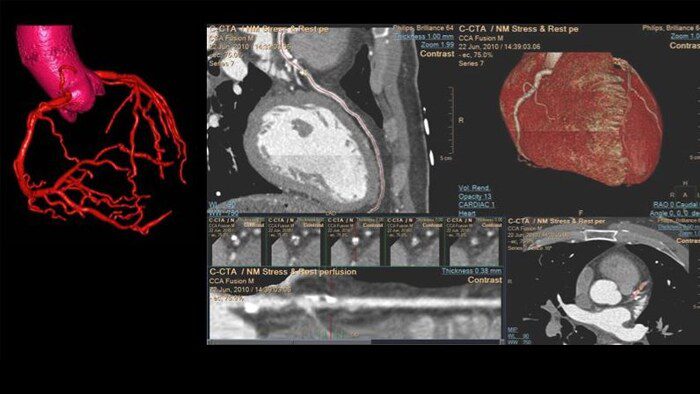TL;DR:
- University of Alberta researchers utilize AI and machine learning to enhance cardiac imaging.
- Dr. Justin Ezekowitz leads a multidisciplinary team to maximize the potential of clinical heart scans.
- AI techniques are applied to cardiac images for earlier and more accurate diagnoses.
- Focus extends beyond singular heart conditions, encompassing heart and blood vessel health.
- The goal is to explore all known and potential heart conditions using Alberta’s healthcare data.
- Emphasis on cautious handling of personal health data due to AI integration.
- A collaborative effort involving experts in imaging, AI, data science, and clinical fields.
- The project aims to serve as a platform for further scientific discoveries.
- Supported by a $1 million grant, plans include establishing an imaging platform and database.
- Potential global impact on populations at risk of heart disease.
Main AI News:
In Canada, heart disease ranks as the second leading cause of death, prompting a dedicated research team at the University of Alberta to turn to artificial intelligence (AI) and machine learning as their allies in improving cardiac imaging techniques. Dr. Justin Ezekowitz, an esteemed associate professor of cardiology, spearheads this multidisciplinary initiative, which seeks to fully leverage clinical heart scans for prevention, diagnosis, and treatment.
Despite the wealth of information embedded in these scans, a significant portion remains underutilized. Dr. Ezekowitz elucidates the team’s mission, involving the compilation of ultrasounds, computed tomographies, magnetic resonance images (MRI), and various other cardiac images from clinical sources. Their aim? To explore innovative AI applications that can unlock previously untapped potential within this wealth of cardiac data.
This pioneering effort lays the foundation for AI to not only comprehend cardiac images but also facilitate earlier and more precise diagnoses by healthcare professionals. The focus, however, extends beyond a single heart condition, encompassing a holistic examination of the heart and blood vessels as interconnected systems. Dr. Ezekowitz elaborates, “When we say we’re starting with the heart, we’re starting with a heart and blood vessel. We plan to then scale it up… to other parts of the body and other organs or conditions that could be relevant.“
The overarching objective is to conduct a comprehensive exploration of all known and potentially unknown heart conditions. Alberta’s robust healthcare system serves as a pivotal source for the necessary cardiac images and associated data. Dr. Ezekowitz emphasizes the unique advantage they possess, stating, “We have one health care system, one source of data, and data repositories where we can rely on combining that, unlike many others in the world.”
To ensure the responsible handling of personal health data, Dr. Ezekowitz acknowledges the need for caution. The integration of AI introduces a myriad of possibilities and challenges, necessitating meticulous consideration of protective measures.
This multifaceted research endeavor draws expertise from various domains, encompassing imaging, AI, data science, and clinical expertise. Dr. Ezekowitz underscores the importance of collaborative teamwork in scientific advancement, asserting, “None of the science that we do would be possible without terrific teams and the teams that have individual expertise. We [look] at science as a team-based activity rather than an individual-based activity. We get to learn from each other.“
Anticipating the involvement of individuals with diverse specializations and interests, Dr. Ezekowitz envisions the project’s potential to serve as a springboard for further scientific discoveries. He states, “Part of the goal is to lay the foundation and the platform… for other scientists to grab hold and take it forward with their discoveries.”
With substantial backing in the form of a nearly $1 million grant from the University Hospital Foundation, the team sets forth its initial plan: the establishment of an imaging platform and database within the first year. Subsequent phases will focus on development and refinement for clinical translation, with the ultimate aim of benefiting populations worldwide grappling with heart disease or its associated risks.
Conclusion:
The application of AI in cardiac imaging, led by the University of Alberta research team, promises to revolutionize healthcare by enabling earlier and more precise diagnoses. This innovative approach, supported by robust collaboration and funding, has the potential to reshape the market for cardiac imaging technologies and contribute to improved healthcare outcomes worldwide.

